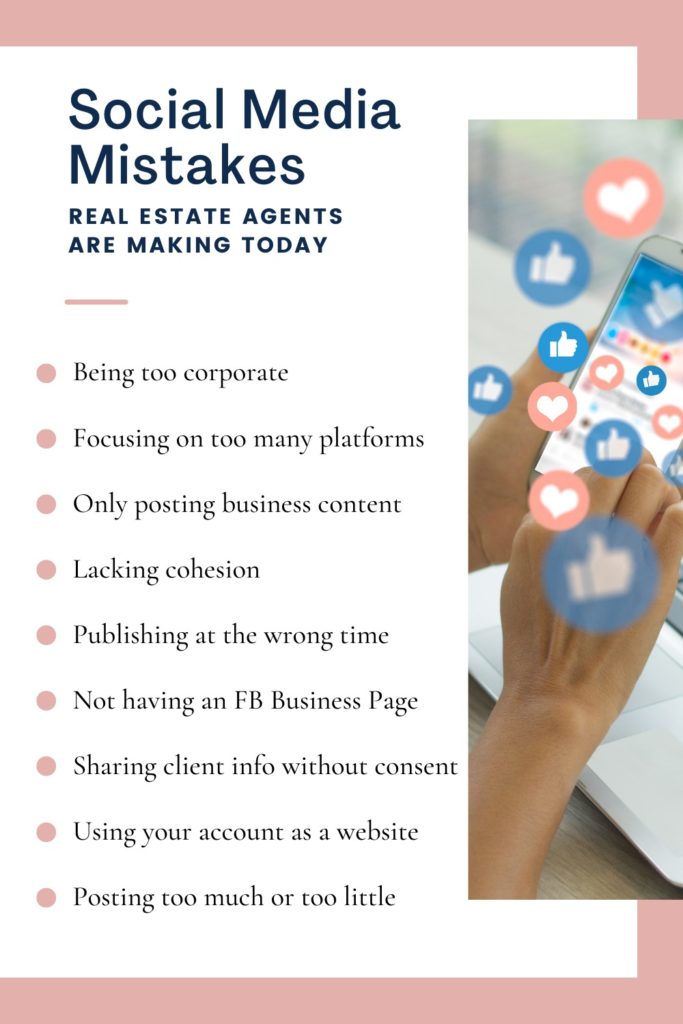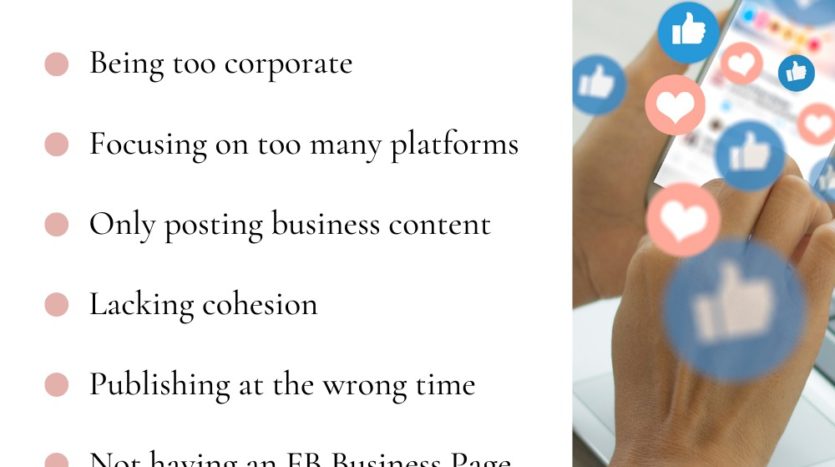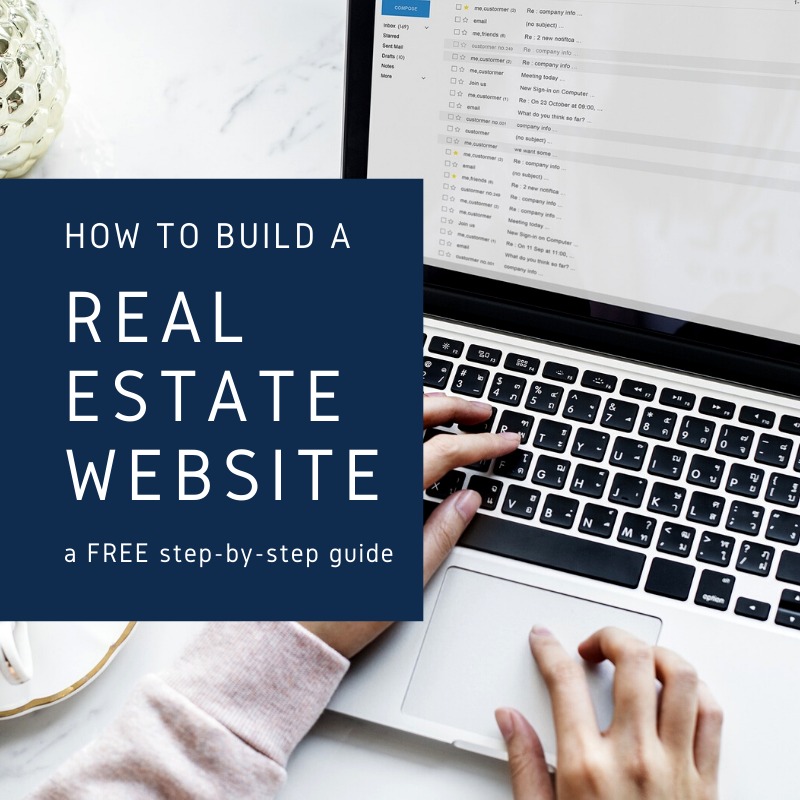As business owners, real estate agents open themselves up to lots of potential social media mistakes. And that’s ok! There’s going to be a learning curve with social media. But you can’t just bury your head in the sand and pretend social media doesn’t exist (even if you sometimes want to!). There are simply too many benefits of social media marketing to ignore.
And the fact that you’re reading this article means you’re committed to correcting any social media mistakes you might be making! So don’t beat yourself up if you’re guilty of one (or several) of the social media mistakes. Simply make a note of each mistake you want to address and work through your list until you have a picture-perfect social media presence.
Real Estate Social Media Mistakes that Should Go Without Saying
Hold on…before we get to the list, we want to call out a few mistakes that should go without saying.
- Using hate speech. There is no place for hate language of any kind on your page.
- Breaking Fair Housing Laws. All your posts and comments must adhere to Fair Housing Law guidelines.
- Knocking the competition. This almost always backfires. Even if you have a legitimate complaint about another agent or broker. If you have an issue with a fellow professional, take it up with them privately, offline.
- Getting into online arguments with trolls. Trolls are real; they will try to get a rise out of you to make you look bad. Remain professional and don’t bother trying to convince someone of your point of view via a social media exchange.
Remember, everything you post on social media can potentially resurface years from now. Even stories and messages can live on forever through screenshots. So it’s in your best interest to pay attention to how your posts represent you.
22 Social Media Mistakes Real Estate Agents are Making in 2022
Ok, now we can count down the top 22 social media mistakes real estate agents are making in 2022…
22. Being Too Corporate
Social media is about connection. Being overly formal can alienate your followers. Don’t be afraid to show off your personality and have some fun! This also means sharing bits of your life outside of the office sometimes. You want people to relate to you on a human level.
21. Withholding Information
This is a super subtle social media mistake real estate agents make. I see lots of agents posting teaser after teaser: I can show you how to sell for top dollar or With my secret marketing plan, we can sell your home faster. But they never share any actionable information. And frankly, I don’t want to call them only to get a sales pitch.
Instead, share information strategically:
- When you post valuable, actionable tips on your social channels, you build authority and earn trust.
- When you want to share a detailed process, go ahead and post that teaser on your social platforms. But then link to your blog post with the detailed information.
- If you have super-valuable information like a secret marketing plan to sell your home faster, use that as a lead magnet (where visitors to your site need to leave their contact information to receive the freebie).
It’s ok to remind followers that they can contact you for a free, custom price analysis or a free list of the best fixer-uppers on the market. But please don’t make that you’re whole feed.
20. Comparing Yourself to Other Agents
Other agents have been in the business longer than you have. Other agents have been on social media longer than you have. And other agents have invested more time (and possibly money) in building their social followings than you have.
Don’t ever get discouraged by how awesome another agent’s online presence is.
19. Making It About You Instead of Your Clients
This is a tricky balance. We’ve already said you want to showcase your personality and share a bit of your private life. But, ultimately, your social profile should benefit your audience.
Here’s an example…
I knew an agent who was trying to get in great shape. So she started sharing all these healthy recipes, posting measurement stats, and uploading pictures of every meal prepped meal she ate. It took over her profile! And while I’m absolutely in favor of sharing bits of your personal life, you have to ask, what is my audience getting out of this?
In the example, the agent’s profile became more of a tool to hold herself accountable for her new fitness goals. Which is great! But it’s out of place on your real-estate-first social accounts. Buyers and sellers don’t get any benefit from that.
18. Appearing Desperate
Even if you’re feeling desperate, please don’t allow that to come across on your social profiles. Desperation undermines your status as a trusted authority in the space.
Instead of begging for listings or referrals, reframe it so that your followers know that you will gladly make time for their listing or referral.
17. Ignoring Your Local Community
Posting general information to help buyers and sellers is great. But you’ll go farther if you help promote your local community. Shout out local businesses, and ask your followers about their favorite pizza place or burger joint. Post about upcoming events. Make your account the social hub of your local community!
16. Only Posting New Listings
If you scroll through your profile’s feed, how many of your posts are simply to promote your new listings, contracts, and closings. If that’s all you’re doing with your social platform, you’re missing out on a golden opportunity to connect with your audience and earn new business.
15. Focusing on Just One Platform
I get it. Instagram lends itself well to real estate as an image-and-video-first platform. Or maybe you’re old-school and only use Facebook. But if you stick with just one platform, you’re missing other demographics of buyers and sellers.
Here’s the general breakdown of the top social networks for real estate agents:
- Instagram: Image-and-video first; most popular with Millennials and Gen Z.
- Facebook: Combination of image, video, and text; most popular with Boomers and Gen X.
- Twitter: Text-first; popular in specific niches like tech.
- Pinterest: Image-first, best for linking to blog posts; user base skews heavily female.
- YouTube: Video-first, best for Millennials, Gen X, and Boomers who prefer longer-form videos.
- TikTok: Video-first, best for Gen Z and Millennials who prefer short-form, entertaining videos.
14. Focusing on Too Many Platforms
If you try to be fully engaged on all platforms, you’ll have very little time to actually work with buyers and sellers. My advice is to focus on Instagram and Facebook; those two cover a lot of ground, and because they’re both owned by Meta, you can easily schedule posts via the Meta business dashboard.
Then I would look to YouTube. The great thing about YouTube is that you can create one long-form video, and chop it up into snippets that you can use on Instagram and Facebook.
If you have a blog, Pinterest can be a wonderful source of traffic to your website. True, some of the traffic will be buyers and sellers out of your area, but perhaps you could refer them to an agent in their market for an easy referral fee!
TikTok works for certain agents targeting a younger demographic. If you’re comfortable being entertaining on video and know how to engage Gen Zers, this could be an option for you.
And Twitter is best for extra witty agents who don’t mind sending 5-10 Tweets per day.
13. Lacking Cohesion
When your follower see a post from you, can they tell it’s yours? Using consistent branding elements (like colors, fonts, filters, and designs) gives your brand recognition a boost and helps your social presence feel like a curated experience.
12. Being Ignorant of Other Lifestyles
Not everyone lives like you do. You might not personally (or politically or religiously or culturally or ideologically) agree with the lifestyle choices others make. And that’s ok. We all have different backgrounds, experiences, and personalities, so we won’t all be best friends. But it’s worth learning about people who have different views than you do. Particularly in your own community.
Take an interest in other people. Not only will you probably find that you have more in common than you thought, but you could also learn something fascinating that broadens your own views!
11. Buying Followers or Likes
It might sound like a good idea to buy followers or likes when you’re first getting started on social, just to get the ball rolling. But this typically backfires. Platforms are getting smarter about recognizing bot accounts and penalizing accounts that buy followers by not showing your posts to as wide an audience as they would otherwise. Better to gain followers organically through valuable content and true engagement.

10. Ignoring Out-of-Area Followers
We already talked about ignoring your local community, but ignoring out-of-towners is a big mistake too. Especially if you’re in an area that’s receiving lots of new residents.
Try posting about reasons to move to your city or what new residents need to know. You could even do educational neighborhood comparisons or fun regional comparisons.
9. Publishing at the Wrong Time
That’s right; there’s a right and a wrong time to post on social media. Immediate engagement with your post shows the platform that your content is trending, which causes the platform to push your post out to a wider audience. If you post in the middle of the night, when your followers are offline, you don’t get the initial push you need.
The solution? Check the most recent data on the best posting times, and schedule your posts rather than trying to post manually at the appointed times. Meta’s Business Suite has a free scheduling tool for FB and IG. You just need to have a Facebook Business Account. Which brings us to our next mistake…
8. Not Having a Facebook Business Account
Did you know that promoting your real estate business from your personal Facebook profile could violate FB’s Terms and Conditions?
To promote your business on Facebook, you need to create a Business account. Not only will this keep you compliant with FB’s T&C, but it comes with lots of benefits as well. With a Business account, you can create FB ads, schedule posts to both FB and Inst from one convenient tool, and allow clients to book consultations with you.
And don’t worry, you can still tell all your personal FB friends about your business. Simply “share” the posts from your business page to your personal page.
7. Using Your Social Account as a Website
You might think a social media profile serves all the same functions as a website. It lets you promote your business, show off your listings, and communicate with potential buyers and sellers. So why would you need your own website when you have a well-rounded Insta profile?
There are many reasons to have a website in addition to your social profiles. Here are the biggest reasons:
- Credibility. Having a website assures buyers and sellers that you run a legitimate business.
- Your Online Hub. Your site serves as the central location of your business online. Your marketing should funnel all your traffic to your site where visitors are greeted with a focused message that helps them decide to work with you.
- SEO. SEO (Search Engine Optimization) is the tech term for getting Google to send you traffic. When you publish content on your website, Google makes note of it. And if someone’s looking for answers to a question your site answers, Google can send them to you. Of course, there’s a lot of content on the Internet. So SEO is a bit of an art. But you don’t stand a chance of ranking on the first page of Google’s search results without having a website. Want to learn more? Check out our article Intro to SEO for REALTORS®.
- Control. How will your business need to shift if your chosen social platform changes its algorithm and no longer shows your content to as many people? That’s happened across multiple platforms, leaving business owners reeling. When you have your own site, you can build your own email list, ensuring that you’ll always have access to the audience you’ve built.
- It’s Available to Everyone. Believe it or not, many people aren’t active on social media. So they won’t have access to your full profile. But your website is accessible to anyone with an Internet connection.
6. Ignoring Comments and Messages
Social media is all about engagement and building relationships. So if a legitimate user reaches out to you, make sure you acknowledge them!
Replying to comments on your posts also shows your platform that there is ongoing engagement on that post, which will bump it up in the algorithm.
Naturally, you get a certain number of messages from bots or spammers. No need to reply to those, but keep an eye out to make sure a real message doesn’t get lost in the spam.
5. Posting Too Much
Have you ever unfollowed an account because their posts were overwhelming your feed? I know I have!
For platforms like Insta and FB, once per day is plenty. You don’t even need to post every single day. Twitter is different. You can post 10 times a day on Twitter, and that might still not be enough to garner traction.
4. Posting Too Little
The more common social media mistake when it comes to frequency is posting too little. If you’re only posting once a week, you’re probably not going to see much progress in your social media growth. Aim for 4-5 posts per week on your chosen platforms.
3. Sharing Client Information Without Express Consent
Posting images or information about your clients without their consent is a HUGE no-no! This is an invasion of their privacy, a sign of disrespect, and a potential security threat if you’re dealing with sensitive clientele.
Posting testimonials and photos of your happy clients with their new homes is a great business practice. But you must always get express agreement from your clients. And don’t just bury legal language in your representation agreements to cover yourself. Ask directly: Is it ok if I post this on my Instagram?
2. Only Posting Business Content
It’s tempting to keep your business profiles purely professional. New listings, open houses, real estate tips, etc. But to start building connections on social, you need to give people a peek at your personal life as well.
Post a behind-the-scenes pic of your home office. Share a family photo. Throw a gym selfie in the mix. The more people can relate to you on a human level, the more likely they are to trust you.
1. Posting Inconsistently
Inconsistent posting isn’t just one of the biggest social media mistakes for real estate agents; it’s also among the most common. You get on a hot streak for a few weeks, then you get busy with more pressing tasks, and ignore your social accounts for weeks or even months.
And I get it! I’m guilty of this myself. Scheduling posts may be easier than ever thanks to tools like Meta’s Business Suite, but creating graphics is extremely time-consuming. And simply deciding what to post and when requires a lot of careful planning.
That’s the main reason we created our monthly DRIP service for real estate agents. You get brand new, professionally designed graphics every month that you can post to your social media accounts. No more wondering what to post. No more hours spent creating graphics. With plans starting at just $9/month, even new agents on a budget can afford to avoid the social media mistakes most real estate agents make!









